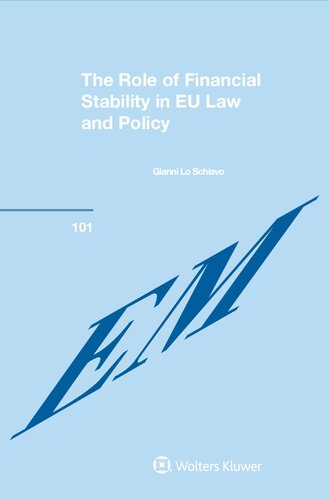

Most ebook files are in PDF format, so you can easily read them using various software such as Foxit Reader or directly on the Google Chrome browser.
Some ebook files are released by publishers in other formats such as .awz, .mobi, .epub, .fb2, etc. You may need to install specific software to read these formats on mobile/PC, such as Calibre.
Please read the tutorial at this link: https://ebookbell.com/faq
We offer FREE conversion to the popular formats you request; however, this may take some time. Therefore, right after payment, please email us, and we will try to provide the service as quickly as possible.
For some exceptional file formats or broken links (if any), please refrain from opening any disputes. Instead, email us first, and we will try to assist within a maximum of 6 hours.
EbookBell Team

5.0
40 reviewsEuropean Monographs Volume 101
Since the outbreak of the 2008 financial crisis, European Union (EU) institutions and Member States have engaged in a major effort to repair the architecture of economic governance of the European Economic and Monetary Union (EMU). This book takes as its starting point the unclear notion of financial stability, which only recently has received a more detailed legal analysis. It examines the evolution of the concept of financial stability during the financial crisis and provides a conceptual framework in order to demonstrate that financial has become a foundational objective in Europe and has set a new normative framework in EU law and policy. Arguing that financial stability is a foundational objective in EU law and policy based on certain normative instruments, this ground-breaking book provides an in-depth and original understanding of the newly developed framework to attain supranational financial stability.
In its analysis of the legal implications of these new instruments, the study examines topics and issues such as the following:
The author shows in detail how an appropriate level of supranational regulation, supervision, burden-sharing and rescue measures strengthen financial stability.
Thereby, the book will appeal to officials in EU institutions and agencies as well as lawyers and academics in EU law and in banking/financial law to gain a clear understanding of role of financial stability and its normative instruments in EU law and policy.
Gianni Lo Schiavo is currently working as a lawyer at the ECB. He obtained a PhD in EU Law at King s College, London, and has written numerous articles and chapters in EU administrative law, EU financial/banking law and EU competition law.